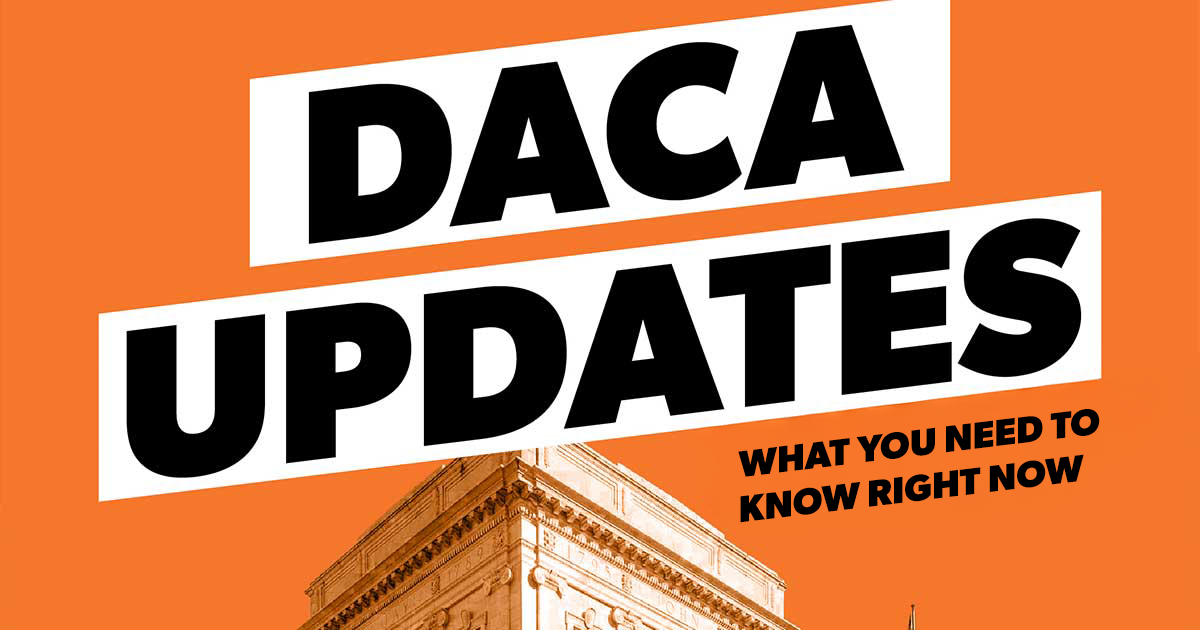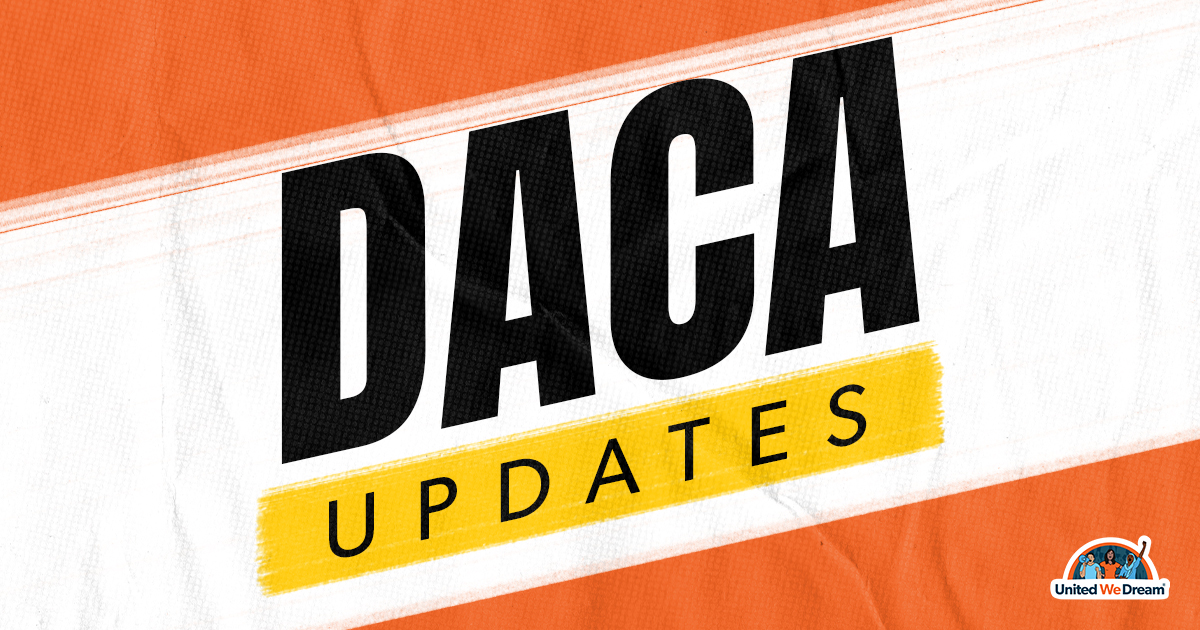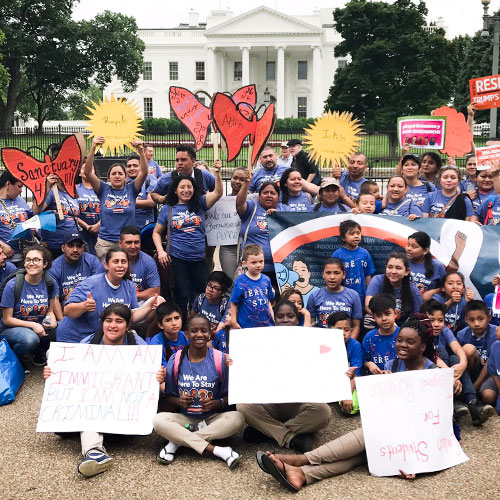[UPDATE ON 03/11/2025] – Explanation of the 5th Circuit’s ruling: The 5th Circuit ruling would potentially permit granting of first-time DACA requests in all 50 states and end work permit access for DACA recipients in Texas moving forward, keeping only the protection from deportation. The 5th Circuit court’s mandate has gone into effect as of 3/11/2025 meaning that first-time requests should begin to be processed and be approved or denied in all 50 states, including Texas. However, we are awaiting updated guidance from USCIS, which will be based on the lower court judge’s implementation of the mandate. It is important to note that current DACA recipients in Texas continue to have access to their current work permits.
Guidance: In light of the Trump administration’s anti-immigrant enforcement priorities, we urge caution in filing first-time requests for DACA. We recommend that you consult with an immigration attorney or DOJ-accredited representative before filing your request to assess your personal risks before you move forward with an initial DACA request.
DISCLAIMER: “This the latest information we know, but is subject to change depending on what happens in the courts and what happens during the Trump administration.”
[UPDATE ON 01/28/2025] – On Jan. 17, 2025, the Fifth Circuit Court of Appeals issued a decision, finding parts of the Biden Administration’s DACA rule to be unlawful. However, the Court also limited the impact of its ruling in key ways: It kept the stay pending further case proceedings, which means that for now current DACA recipients–across the U.S.–can still renew their DACA. The Fifth Circuit decision also limits the scope of the injunction to undocumented individuals residing in the state of Texas. The timing for this ruling to go into effect is unclear and as such, the status quo remains the same for now (people everywhere can continue to renew if eligible). To learn more about the 5th Circuit decision, please see MALDEF STATEMENT ON APPEALS COURT RULING ON DACA here.
For now, those who currently have DACA, or those whose DACA has expired within one year, can continue to renew, and advance parole remains available. Initial DACA requests (and late renewal requests from those whose DACA expired over a year ago) can be filed, but will not be granted at this time. The litigation is ongoing, and we encourage you to periodically visit our website and follow us on social media to learn of any new developments. To receive the latest updates and developments on DACA ,sign up here.
It is also important to note that there has been a change in administration as of January 20, 2025 (inauguration day). The first Trump administration had previously attempted to end DACA, and we do not know what will happen next. Below is the latest information we know, but is subject to change depending on what happens in the courts and what happens during the Trump administration.
I currently have DACA. How Does the Pending Litigation and the Trump Administration Affect My DACA?
If you currently have DACA, your DACA and work permit are still valid. You can still use your social security number and work permit; nothing has changed with your current DACA. Don’t let your DACA and work permit expire. Consider renewing, ideally with the assistance of an immigration attorney or accredited representative now! Also, consider renewing your DACA early (e.g., if your DACA expires within a year) in case there is a change in the availability and processing of DACA renewal requests. Keep in mind that there could be an overlap in the dates of your last and new DACA issuances if you decide to apply early.
Questions on first-time (initial) DACA requests.
In 2021, Judge Hanen ruled that USCIS can no longer grant DACA to new DACA requestors. I have never had DACA before and filed a request before the Hanen decision. I completed my biometrics; what will happen next?
A 2022 Fifth Circuit opinion and Judge Hanen’s order prohibits USCIS from granting any first-time initial DACA requests at this time. If you filed your first-time initial DACA request with USCIS but it was NOT decided on, USCIS continues to hold your request and your payment but will not approve or deny your request until further notice. We do not yet know what will happen with the pending initial requests under the Trump administration.
Are first-time DACA requests automatically rejected now?
No. USCIS can still accept first-time initial DACA requests (meaning USCIS will not reject and return your request) but cannot grant requests at this time due to Judge Hanen’s order and the 2022 Fifth Circuit opinion.
I was planning on sending my first-time request out soon. Should I still?
The 2022 Fifth Circuit opinion and Judge Hanen’s order prohibit USCIS from granting any first-time initial DACA requests at this time, even though initial requests can be accepted for filing. In light of the Trump administration’s anti-immigrant enforcement priorities, we urge caution in filing first-time requests for DACA. People who have had any involvement in the criminal legal system should exercise additional caution before filing a first- time request. We recommend that you consult with an immigration attorney or DOJ-accredited representative before filing your request. As litigation proceeds through the courts, we will keep you updated here.
Am I at risk of deportation now?
The new administration has not singled out DACA recipients as a priority for deportation. However, Trump tried to terminate DACA during his first term and we do not know what will happen under this new administration. Also, DACA recipients–like other undocumented individuals–could be caught up in ICE enforcement actions. We recommend that you consult with an immigration attorney to assess your risks.
If you have any problems with Immigration and Customs Enforcement (ICE) or Customs and Border Protection (CBP), please call 1-844-363-1423, UWD’s MigraWatch Hotline, as well as your Senator or Representative, who may be able to liaise with ICE on your behalf.
Questions on DACA Renewals
Are renewal DACA requests being processed?
Yes. For individuals whose DACA has not expired or expired within one year, USCIS will continue accepting and processing DACA renewal requests until either there is a court order saying otherwise, or until the Trump administration takes action to change or end processing of DACA renewals. Don’t let your DACA and work permit expire! Consider renewing, ideally with the assistance from an accredited organization or an immigration attorney. If your DACA expires within a year, consider renewing now! Keep in mind that there could be an overlap in the dates of your last and new DACA issuances if you decide to apply early.
Should I renew early?
We recommend that you consult with an immigration attorney or DOJ-accredited representative to determine if now is the best timing for your DACA renewal request. Due to the ongoing litigation and the change in administration, there may be a limited window of opportunity to apply for renewal. USCIS encourages renewals to be filed between 120 and 150 days prior to the expiration of your DACA. However, USCIS will accept renewal requests earlier than 150 days before expiration. Keep in mind that USCIS may hold onto your request until the 150-day mark before expiration before processing or USCIS may process early-filed requests quickly, which could result in cutting short the current DACA grant and having the new DACA grant expire sooner than it would have if the renewal had been processed later.
Can I submit an expedite request for my DACA?
While USCIS does not currently process formal expedite requests from DACA requestors, it is our understanding that USCIS may still consider circumstances– such as those described on USCIS’ expedite request webpage— that warrant more expeditious processing. We therefore encourage you to include any information that may be helpful to USCIS in processing your renewal on a cover letter that you include with your DACA renewal filing and follow up with the USCIS contact center to request expedited processing if warranted.
Can I file online?
Yes, DACA renewals can be filed online. Current DACA recipients must first create a USCIS online account in order to file Forms I-821D (application for DACA), I-765 (application for work authorization) and I-765WS online. The online account provides a potentially quick method of submitting forms, paying fees, and tracking the status of USCIS applications. This is only applicable to DACA renewal requests. It is always recommended to receive assistance from an accredited organization or an immigration attorney when filing any immigration documents and they may be able to help troubleshoot issues when applying online. The total cost of the application is also $50 less when filing online.
How should I pay for my renewal?
If you file on paper, you should include two separate payments with your request, one for each application form. For example, if you are paying by check you should include a check for $520 for the Form I-765 and a separate check for $85 for the Form I-821D. Checks that are made for $605 (the full cost of requesting DACA through paper filing) may be returned, and USCIS may reject the entire package. USCIS has indicated that it will no longer accept one bundled payment (check, money order, etc.) for all the forms you include in your request for DACA through paper filing. If you file online, there is a $50 discount and a single payment of $555 is submitted electronically.
If you need financial help, please see “Additional Resources” at the bottom.
How long will USCIS be accepting DACA renewal filings?
USCIS will continue accepting and processing DACA renewal requests until there is a court order or action by the Trump administration mandating otherwise. The Fifth Circuit appeals court issued a decision that found parts of the Biden Administration’s DACA rule to be unlawful. However, the Court also limited the impact of its ruling in key ways: It kept the stay pending further case proceedings, which means that current DACA recipients–across the U.S.–can still renew their DACA while the case makes its way through the courts and limits the scope of the injunction to individuals residing in the state of Texas. The timing for this ruling to go into effect is unclear and as such, the status quo remains the same for now (people everywhere can continue to renew if eligible).
I would like to renew my deferred action and work authorization under DACA, but my DACA lapsed for a year or more. What does this mean for me?
If you submit a DACA request a year or more after your last DACA grant expired (or at any time if your most recent DACA grant was terminated early by USCIS), your request is currently considered by USCIS as an initial request and will not be granted at this time. At this time, USCIS will accept these requests for filing, accept the payment and issue receipt notices, but will not process or approve these filings due to the 2022 Fifth Circuit and Judge Hanen’s order. See the guidance provided by USCIS.
Questions on Advance Parole
Is advance parole open for DACA recipients right now?
Yes. According to the latest guidance from USCIS, the agency will continue to process and grant advance parole for current DACA recipients. We recommend that you consult with an immigration attorney or DOJ-accredited representative before applying for advance parole and before traveling outside the U.S. Due to the ongoing litigation, there may be a limited window of opportunity to apply for advance parole. We do not yet know what will happen with advance parole applications and there could be greater risks involved when traveling under the current Trump administration. If you are interested in applying for advance parole, we recommend speaking to an immigration attorney or DOJ-accredited representative immediately and consider filing emergency advance parole requests.
I was approved for advance parole; how will the Fifth Circuit’s decision and Judge Hanen’s decision affect the granting and use of my advance parole?
We recommend that you consult with an immigration attorney or DOJ-accredited representative before traveling outside the U.S. Both the Fifth Circuit’s 2022 ruling and Judge Hanen’s decision permit Customs and Border Protection (CBP) to honor advance parole granted to DACA recipients by USCIS, but the individual will still be subject to an immigration inspection at the port of entry. It is unclear how travel on advance parole will be impacted by future court orders or executive actions. We do not yet know what will happen with advance parole applications and there could be greater risks involved when traveling under the current Trump administration. Therefore, if you were granted advance parole but have not yet traveled outside of the U.S. using your valid advance parole document, we recommend that you speak with an immigration attorney or DOJ-accredited representative about the risks and benefits of using advance parole at this time.
My advance parole request is still pending. Will USCIS process it?
As noted above, we recommend that you consult with an immigration attorney or DOJ-accredited representative before traveling outside the U.S. Both the Fifth Circuit’s 2022 ruling and Judge Hanen’s decision permit Customs and Border Protection (CBP) to honor advance parole granted to DACA recipients by USCIS, but the individual will still be subject to an immigration inspection at the port of entry. It is unclear how travel on advance parole will be impacted by future court orders or executive actions. We do not yet know what will happen with advance parole applications and there could be greater risks involved when traveling under the current Trump administration. If your request is still pending , you should speak to your attorney or accredited representative about the risks and benefits of using advance parole at this time.
How do I ask that my pending advance parole request be expedited?
If you have a current advance parole application pending at USCIS, you may consider requesting that your application be expedited. The request to expedite is within the discretion of USCIS and requires documentation both of the urgency of the request and reasons it should be granted. USCIS field offices can grant expedited processing of advance parole requests to individuals if:
- You have already submitted an application by mail;
- Your application has been pending for several months;
- Your departure date is approaching; and
- Your travel request meets the USCIS criteria for expediting decisions (e.g. severe financial loss, emergencies, humanitarian reasons, etc.)
Contact your congressional representative if you require further advocacy for your expedite request. Call your representatives’ and senators’ offices and ask to speak with their immigration caseworker. You can find out who your congresspeople are and get their contact information by entering your zip code at www.house.gov/representatives/find/ (to find your representative) and www.senate.gov/senators/index.htm (to find your senators).
As noted above, due to the change in administration, we do not yet know what will happen with advance parole applications and there could be greater risks involved when traveling under the Trump administration. If your parole request was approved but you have not yet traveled outside of the U.S. using your valid advance parole document, you should speak to your attorney or DOJ-accredited representative about the risks and benefits of using advance parole at this time.
How can I request emergency advance parole?
USCIS currently accepts emergency advance parole applications at local field offices. Generally, an Infopass appointment is required, but some field offices permit walk-ins. To apply, you must bring to your appointment the completed advance parole application packet (including filing fee), along with evidence to demonstrate the urgent need to travel within 15 days. Emergency advance parole can be granted the same day as the appointment. As stated above, we recommend that you consult with an immigration attorney or DOJ-accredited representative before applying for advance parole and before traveling outside the U.S. Due to the ongoing litigation and possible executive actions, there may be a limited window of opportunity to apply for advance parole. Additionally, there could be greater risks involved when traveling under the Trump administration.
I have DACA and am currently outside the United States with advance parole. Can I still return to the U.S. using my advance parole under DACA?
Both the Fifth Circuit’s 2022 ruling and Judge Hanen’s decision permit Customs and Border Protection (CBP) to honor advance parole granted to DACA recipients by USCIS, but the individual will still be subject to an immigration inspection at the port of entry. It is unclear how travel on advance parole will be impacted by future court orders. Furthermore, we do not know what will happen with DACA and advance parole under the Trump administration. If you are outside the U.S. with a valid advance parole document, you should speak to your attorney or DOJ-accredited representative about how to prepare for your return to the U.S.
Next Steps
Can the Fifth Circuit’s decision be appealed?
After hearing oral arguments in the Texas v. US case in October 2024, the Fifth Circuit issued a new decision on January 17, 2025, finding parts of the DACA rule to be unlawful. The Court kept the stay issued by the lower court pending appeal, meaning that for now current DACA recipients throughout the U.S. can still renew their DACA. While the Fifth Circuit decided that the injunction in this case would be limited to Texas, it is still to be determined exactly what this will mean and how an injunction limited to Texas would be implemented. Any party could appeal this decision further to the U.S. Supreme Court.
What can we do now?
With Trump taking office again, and following the U.S. 5th Circuit Court of Appeals decision in the Texas v U.S. case, the Home is Here Campaign is clear-eyed in its mission to protect and defend DACA recipients and immigrant communities at large. During Trump’s first term in office, he and his cabinet unleashed catastrophic assaults to try to end DACA, a program that temporarily protects over half a million people from the threat of deportation, allows many to access stable employment, and build their lives, families, and futures here.
Make no mistake: immigrant youth are prepared to meet this moment with courage and resilience. From hosting Know Your Rights, Know Your Power training for our communities to launching a host of nationwide actions aimed at demanding our elected officials shore up protections now, we are not backing down – not now, not ever. Members of Congress, Governors, Mayors, City Councils and others, all have a role to play to meet this moment with the urgency it demands to protect millions of families whose lives Trump is hellbent on destroying. Today and every day, they must refuse to yield to Trump’s terror and choose to show up for immigrants and all communities.
Take Action
In the face of a violent anti-immigrant platform that is being led by President Trump, the Home is Here campaign is ready to continue the fight to relentlessly defend DACA recipients and our communities at every turn. Trump’s continuous pledge to end DACA, carry out mass deportations and family separations, and violently target and raid communities nationwide, will be met with bold, powerful resistance as directly-impacted individuals and allies forge a new path to a future in which we’re all protected. Text “Home Is Here” to 787-57 to stay plugged in with the Home Is Here Campaign.
Congress cannot continue to wilfully ignore Trump’s goal to target as many immigrants as possible and wreak complete havoc on families, cities, local economies, workplaces, and more nationwide. We demand Congress find a way to urgently pass permanent protections for as many people as possible, and for elected officials at every level – from Governors, Mayors, and more – to seize every opportunity to reject Trump’s agenda now and immediately shore up protections for immigrants nationwide.
To receive the latest updates on DACA text “DACA Info” to 787-57.
Additional Resources
- Financial help for DACA requesters– for a how-to renew guide, and a list of organizations that provide financial help
- DACA Renewal Fund – to Donate
- Map of low-income & pro-bono lawyers across the country. :https://www.immigrationlawhelp.org/
- Timeline of DACA developments, particularly in the courts https://www.nilc.org/resources/timeline-daca-in-the-courts/
- DACA renewal calculator https://www.nilc.org/resources/dacarenewalcalculator/









